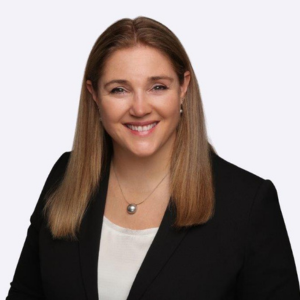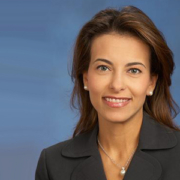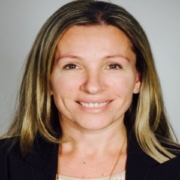Movers and Shakers: Karyn Twaronite, the EY Americas Inclusiveness Officer
 “Differences do matter,” began Karyn Twaronite, the EY Americas Inclusiveness Officer and a partner of Ernst & Young LLP. “I’m excited about expanding the definition of diversity as it applies to all men and women.”
“Differences do matter,” began Karyn Twaronite, the EY Americas Inclusiveness Officer and a partner of Ernst & Young LLP. “I’m excited about expanding the definition of diversity as it applies to all men and women.”
She explained, “Many years ago, diversity work was about compliance, looking at numbers and representation. This is important, but there’s more to it than that. I like to think of the evolution as the three Cs. The first C is compliance and was focused on following the rules. The second C is character — diversity was seen as the right thing to do and something that your company needed to do to be viewed as modern. Today, we’re at the third C, which stands for commerce. It also focuses on making a difference to top and bottom lines in business.”
Twaronite continued, “Today we see diversity and inclusiveness, or D&I, as a way to further deliver quality service, innovate, and solve problems. For so many companies this is a competitiveness issue, not only to be seen as employers of choice, but also to enhance the quality of work. Diverse and inclusive teams provide better service to clients, and our high-quality service to our clients is key to our brand.”
She added, “I’m fortunate that I work at a company where D&I are embedded in our culture, and where D&I get a seat at the leadership table.”
Career Path Leading to Diversity
“I’ve been at EY for over 20 years, going on 23 this year,” Twaronite began. “I’ve had a multitude of experiences — after all, a career in our profession is not uniform. I also think it’s important to be experientially mobile and to even make counter-intuitive moves.”
After earning her bachelor’s degree in accounting from Miami of Ohio, Twaronite went on to earn a master’s degree in taxation at Fordham University. In the first half of her career at EY, she worked in client-serving roles in tax for financial services clients, later moving into Ernst & Young LLP’s Talent team, which focuses on the firm’s people.
After working in human resources (HR), she began running HR for the Northeast region of the firm, and later for the US and Canadian member firms as well. She also earned certifications in HR from Harvard and Cornell. “Having line experience was helpful for working in HR. Being a tax person, I had experience with research, data, and analytic skills that are still incredibly important to my work. Yet I also built upon my credentials to make sure that if I was going to work in the talent space, I had expanded my relevant learning beyond tax and accounting.”
Climbing the ladder along the way, she also became a partner of Ernst & Young LLP.
She added, “I’m proud that I’ve been able to raise my son in a dual-career family, while also accomplishing what I set out to do in my career. When I had a toddler at home and my husband traveled quite a bit, I was sponsored to be able to make partner. Looking at the bigger picture, I’m happy that I’ve not only advanced, but even more so that I’ve had a versatile career and learned a lot in the unique opportunities I’ve been given.”
While building her career in tax and HR, Twaronite also developed a passion for diversity and inclusion. She co-founded Ernst & Young LLP’s Northeast Professional Women’s Network in 2000 and served as the group’s Co-Chair until 2011. Her dedication to the Professional Women’s Network, other Professional Networks and D&I initiatives led to a unique opportunity: she was asked to serve as the EY Americas Inclusiveness Officer.
“When I was offered this position it was to lead inclusion and work for the highest-ranking leader in the Americas. Coincidentally, I had been considering another position besides this one, so I had a lot of thinking to do,” she recalled. Uncertain about which path to pursue, she called her parents for advice, and they put her on speakerphone to talk out her options.
“Here I was, 43 years old, calling my parents to ask for advice,” she said with a laugh. “And as usual, they were really helpful. I explained that I had this special opportunity for a non-linear spot that was unique, and my father made a powerful observation. He said, ‘You don’t know when the opportunity will come along again to serve in a role where you have such support for something you feel so passionate about.’ That really helped me frame what I was feeling.”
It’s been two years since she became the EY Americas Inclusiveness Officer. “I’m thrilled to be in this spot,” she said. “The definition of diversity continues to expand beyond gender to include sexual orientation, education, stylistic differences, abilities, and much more. Inclusion is how you make that mix work and maximize those differences.”
Sponsorship and Overcoming Bias
Twaronite advised women to focus on building their networks throughout their careers. “It’s important to develop your professional network with sponsors and mentors before you need them,” she said. “Mentors are not enough — sponsors are critical. Mentors talk with you, while your sponsor also talks about you. You have to earn the right to have a sponsor. Sponsors don’t just happen — you have to work further and be proactive.”
“Research shows that women are 50 percent less likely to be sponsored than white men. Research also indicates that people of color are two-thirds less likely to be sponsored than white men,” she said.
It’s possible this can be attributed to unconscious biases, she explained, and that can ultimately create an uneven playing field for women and people of color. “We have been working with Dr. Mahzarin Banaji, a professor at Harvard, on unconscious bias for about six years. Everyone has some type of bias and we need to be aware of it. For example, a boss may not tell a woman about an opportunity that requires a lot of travel because she may have a child at home, and the boss may be merely trying to protect her from having to make a difficult decision. In reality, the boss may be relying on an assumption that’s correct or incorrect, although possibly well-intended. This is really making an assumption based on an unconscious bias. The way to combat this is by communicating.”
Twaronite continued, “Sometimes people may have an unconscious bias, and they may not be forthright with giving feedback to women. My advice to women is to ask for feedback frequently, especially informally, whether you’re in a cab on the way back from a meeting or in a hallway walking with a colleague. And really listen — even if it’s something that’s upsetting or critical. Feedback is a gift — act upon it.”
Also, she advised, “You have to be disciplined about sharing your accomplishments — and you have to do it more than just once a year. Be prepared to talk about yourself informally. Share a big project you just closed on, other milestones, or customer feedback. It helps for people to know what you stand for, what you are proud of, and what you are committed to achieving.”
The Role of Companies in Removing Barriers
“EY has a number of initiatives to ensure women have the right opportunities and experiences to advance. It’s really important for any organization to be proactive in making sure women are not just sitting on slates,” she said.
“We may have women leaning in, but the reality is we also need companies to be there supporting them when they do so. That’s why women must be sure they are leaning in at the right organization. EY takes pride in being prepared to support women.”
Twaronite was also enthusiastic about a new D&I video her team produced, featuring EY employees as the stars. It’s designed to help communicate the expanding definition of diversity and how to tap into the business advantages created by difference.
In Her Personal Time
Outside the office, Twaronite enjoys running and walking in Central Park and spending time with her son, husband, and friends. She also enjoys traveling. “In addition to my work travel, I also enjoy traveling on a personal level,” she continued. “My family most recently took a trip to Argentina and Brazil, which was very special to us and enabled us to learn even more about South American culture.”
By Melissa J. Anderson (New York City)










